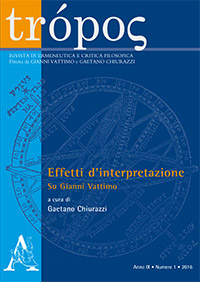Estratto da
TRóPOS
Effetti d’interpretazione. Su Gianni Vattimo
Praxis and the Impossibility of Hermeneutics? Reflections on Vattimo’s Beyond Interpretation and “The Future of Hermeneutics”
TRóPOS
Effetti d’interpretazione. Su Gianni Vattimo
Praxis and the Impossibility of Hermeneutics? Reflections on Vattimo’s Beyond Interpretation and “The Future of Hermeneutics”

Stefan Böhm wrote of Theodor Adorno, “Negative dialectics designates a position which includes its own failure, i.e. which produces the truth-effect through its own failure” (Böhm 2006 p.188). This essay suggests that key humanistic truth-effects arise from the inevitable “failure” of Vattimo’s fundamentally “enlightenment” mode of hermeneutics. Is the inevitable consequence of Vattimo’s philosophical endeavour the “weakening” of hermeneutics itself ? Must hermeneutics fail to succeed? This argument is not so much critical of Vattimo’s account of the relation between hermeneutics and praxis as a thinking with and through his reasoning. The approach acknowledges the enormous achievement of Vattimo’s The End of Modernity which allowed Nietzsche’s nihilism as a post–Kantian metaphysical scepticism to become tractable as a vehicle of historico–philosophical critique. Nietzsche, the first modern philosopher to make a career from deploying the concept of interpretation, initiates a movement of thought which through Vattimo’s singular mediation comes, by implication, to question the possibility of hermeneutics itself. In addressing the very possibility of hermeneutics, or rather, its (inevitable) failure, our argument concerns fundamental horizon–questions concerning the future of hermeneutics. Would hermeneutics as an intellectual orientation prosper better if it were to pass over or to fall silent about the key questions of meaning and truth? As a “hermeneutical essay” the argument which follows is inevitably provisional. The concluding claim suggests that hermeneutics, as conceived by Vattimo should endure its own kenosis and that its defining concern with meaning and interpretation be abandoned in favour of participatory epistemology.
| pagine: | 25-43 |
| DOI: | 10.4399/97888548948603 |
| data pubblicazione: | Giugno 2016 |
| editore: | Aracne |








